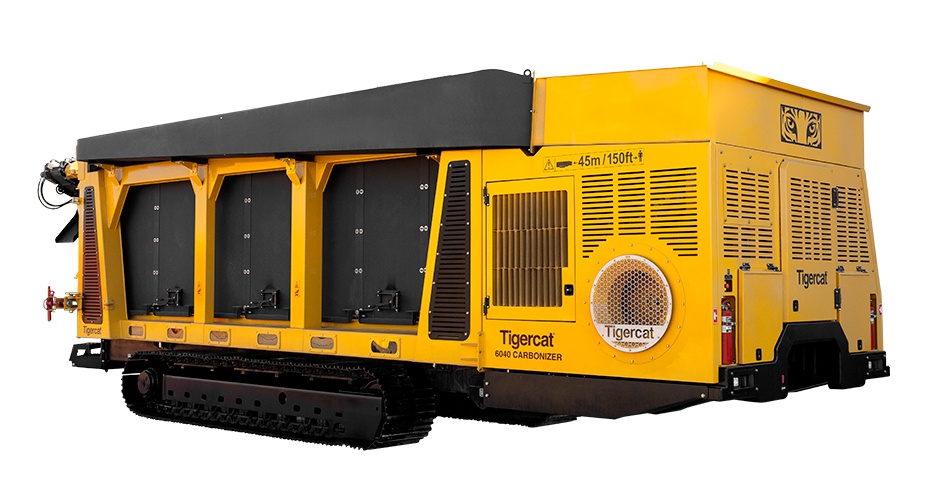New From Tigercat: 6040 Carbonizer
Tigercat Industries has announced the official release of its 6040 carbonizer—which replaces the 6050 carbonator that Tigercat marketed for a brief time after acquiring the product through the purchase of ROI in 2019. The mobile onsite wood conversion system is once again available after a comprehensive, ground-up redesign.
The 6040 is one of the most environmentally friendly wood debris reduction and conversion systems available on the market. The machine inputs woody debris and produces a high-quality organic carbon with up to 90% material reduction. It is an ideal solution for converting unwanted logging and agriculture residue into a useful, high grade organic carbon that can be left onsite as a soil additive or marketed for many different commercial uses. The process captures 20 to 30% of the available carbon in the feedstock and sequesters it for thousands of years, furthering the goals of greenhouse gas reduction. The innovative conversion process operates at high throughput levels and produces very low emissions because the gasses are combusted in the controlled combustion zone.
The 6040 redesign addresses performance related issues experienced in the original design and represents the knowledge of the applications that Tigercat engineers and field support personnel have gained over the past five years. The grates in the carbonizing chamber are now made up of seven different sections that can be rotated 180° to balance wear and extend life. Individual sections can be replaced as required. The undercarriage, auger trough, and conveyor system are all bolt-on sections to the main carbonizing chamber frame. Everything can be separated for service and replacement if required. The modular bolt-on design also allows for differing expansion rates of these major components.
The replaceable thermal-ceramic panel seal plate design has been improved, reducing panel wear. The composition of the panels has been altered to decrease back-face temperature while storing and utilizing more of the heat energy produced during the carbonizing process. This provides a more stable and sustained temperature within the carbonizing chamber. The result is increased efficiency, higher infeed rates, reduced emissions, and a greater yield of higher quality organic carbon.
The auger trough is designed for minimal air leakage, assisting with under-air efficiency, further defining the secondary combustion zone, while reducing hotspots that could form from an inefficient base pressure or vacuum. Unlike the 6050, the auger trough, where the quenching process takes place, is entirely sealed. Once the organic carbon drops through the grates, it is fully quenched by the water bath. An onboard hydraulic water supply pump and integrated automatic water level control system reduces water consumption by about 50% compared with the 6050. Automated water fill, level control, and water retention provides the operator a window of time to replenish the water supply if required.
The adjustable conveyor simplifies handling and management of the organic carbon product. It pivots 105° from side to side and can be raised or lowered. The conveyor easily folds for transport and does not have to be detached from the machine frame.
Temperature control sensors are located throughout the machine. This, coupled with the Tigercat designed operating software and telematics system, improves data access and customer support. The 6040 development also emphasized parts commonality among other Tigercat products including pumps, motors, valves and filters, simplifying parts inventory management at the dealer and end user level.
The overall machine weight has been reduced from 43 550 kg (96,000 lb.) to 37 650 kg (83,000 lb.). Extended track frames improve load distribution on the trailer and reduce soil compaction on the ground.
Latest news
MDF Or Bioenergy For Roseburg?
Roseburg reports it is exploring the feasibility of locating a second MDF panel plant or bioenergy production facility within its current Western, U.S. operating footprint. The proposed facility would use up to 300,000 bone-dry tons of wood residuals each year…
New Sawmill Coming To Louisiana
Teal Jones Group marked the beginning of construction of an $110 million SYP sawmill near Plain Dealing, La. on July 11 with a groundbreaking ceremony. Canada-based Teal Jones Group had disclosed in December it was considering northwest Louisiana as the site of a sawmill…
Key Committee Boosts Biomass Before Fall EU Parliament Vote
Working on the EU’s upcoming Renewable Energy Directive III (REDIII) that will update the Union’s renewable energy policies, the EU Parliament’s Industry Research and Energy (ITRE) Committee recently voted to not only uphold policies that treat wood pellets as carbon neutral, but also expand the use of wood pellets as a coal substitute…
Wood Bio Conference Speaker Pete Madden: “This is going to be an incredible decade for our sector.”
Going into the seventh Wood Bioenergy Conference & Expo, organizers said the lineup of keynote speakers, on paper, was the best in the history of the event. The real thing was even better. Speakers from their wide-ranging perspectives provided a crystal clear picture of how the wood-based energy shapes up today and what to expect moving forward…
Find Us On Social
Subscribe to Our Newsletter
Wood Bioenergy News Online hits the inboxes of subscribers in the wood-to-energy sectors.
Subscribe/Renew
Wood Bioenergy is published and delivered worldwide 6 times per year. Free to qualified readers in the U.S. Subscribers outside the U.S. are asked to pay a small fee.
Advertise
Complete the online form so we can direct you to the appropriate Sales Representative.

